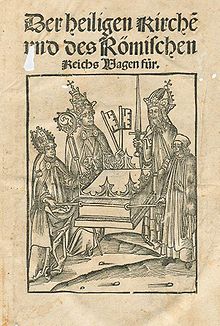Johannes Hug
Johannes Hug (also Johannes Hugo , Johannes Hugonis ; * around 1455 in Schlettstadt ; † after 1505 probably in Strasbourg ) was a canonically trained clergyman and author who worked in Strasbourg .
Life
There are hardly any life testimonies to Hug. Before he was matriculated in Erfurt in 1470, he received training at the Latin school in his hometown Schlettstadt under the famous teacher Ludwig Dringenberg (as Jakob Wimpfeling testifies). The notarial instruments added to his work show him as vicar or pastor of St. Stephen in Strasbourg in 1498 and 1500. In 1502, a letter of indulgence from Cardinal Raimund Peraudi names him . It is unclear whether a letter from Johannes Hugonis from 1522 refers to him.
In 1506 the Strasbourg author Johannes Adelphus Muling added to his edition of the music tract "Lilium musicae planae" by Michael Keinspeck the Latin letter dated 1506 from a Strasbourg citizen Johannes Hugo to an unnamed Carthusian. The learned pastor of St. Stephan can be seen in him.
In 1504 Hug published his work "Quadruvium", illustrated with high-quality woodcuts in a Latin and German version by Johannes Grüninger in Strasbourg, a strongly canonical discussion of the roles of Pope, Emperor, Bishops, Pastors and laypeople, for J. Franck the " first textbook of German constitutional law "(ADB). The strongly time-critical book can be assigned to the contemporary reform discourse, which aimed to reorganize church and empire. Probably knew the same time acting in Alsace called Oberrheinische revolutionary Hugs work that this Cardinal Peraudi, the Elector of Mainz , Berthold of Henneberg and King Maximilian I devoted. Hug cannot be addressed as a humanist , his "Quadruvium" is in the tradition of canonically learned works.
There are two types of Latin printing. The Strasbourg edition of 1504 was reprinted in Paris in 1509, and as late as 1549 the text was included in a huge legal compilation (Tractatus universi iuris, Lyon 1549, again Venice 1584).
literature
- Klaus Graf : The Strasbourg scholar Johannes Hug and his forgotten work "Quadruvium ecclesiae". (Strasbourg: Johann Grüninger 1504), in: Humanisten am Oberrhein, ed. by Sven Lembke / Markus Müller, Leinfelden-Echterdingen 2004, pp. 175–187 ( online ) ( supplements )
- Franz Josef Worstbrock : Johannes Hug. In: author's lexicon, 2nd edition, vol. 11, col. 694 ff. (With minor errors)
- Jakob Franck : Hugo, Johannes . In: Allgemeine Deutsche Biographie (ADB). Volume 13, Duncker & Humblot, Leipzig 1881, p. 328 f.
- Ulrich Muhlack : Hugo, Johannes. In: New German Biography (NDB). Volume 10, Duncker & Humblot, Berlin 1974, ISBN 3-428-00191-5 , p. 27 ( digitized version ).
Web links
- Latin. Grüninger print
- German translation
- Latin. Reprint Venice 1584, p. 289 ff.
- Keinspeck edition with Latin Hug letter
| personal data | |
|---|---|
| SURNAME | Hug, Johannes |
| ALTERNATIVE NAMES | Hugo, Johannes; Huck Johannes; Hugonis, Johannes |
| BRIEF DESCRIPTION | Clergyman and author |
| DATE OF BIRTH | around 1455 |
| PLACE OF BIRTH | Schlettstadt |
| DATE OF DEATH | after 1505 |
| Place of death | Strasbourg |
